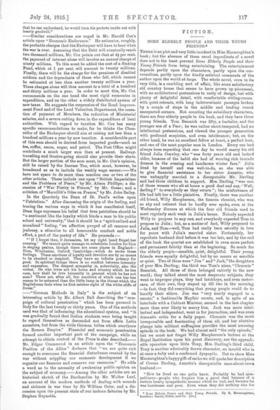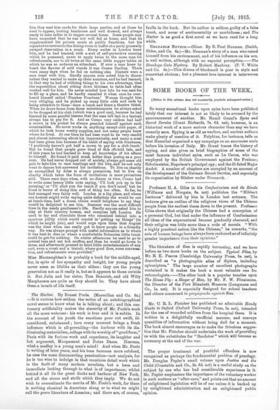FICTION.
SOME ELDERLY PEOPLE AND THEIR YOUNG FRIENDS.* THERE is no plot and very little incident in Miss Macnaughtan's book ; but the absence of these usual ingredients of a novel does not in the least. prevent Some Elderly People and their
Young Friends from being entertaining. The entertainment depends partly upon the characters, partly upon the con- versations, partly upon the kindly satirical comments of the author upon the world at large. The whole novel, even to its very title, is a rambling sort of affair, like some satisfactory old country house that seems to have grown up piecemeal, with no architectural pretensions to unity of design, but with
plenty of delightful detail, with comfortable sitting-roams with quiet retreats, with long indeterminate passages broken by a couple of steps in the middle and leading round unexpected corners. Not counting the subsidiary characters, there are four elderly people in the hook, and they have three young friends. Tone Beamish was fifty, a bachelor, and the younger son of a Peer ; he was rather short-tempered, had no intellectual pretensions, and viewed the younger generation with profound suspicion, and even intolerance; but, on the other hand, he was an excellent fellow at heart, a perfect host, and one of the most popular men in London. Every one had
always been expecting that one day be would marry his old friend Julia Crawley, who "was forty years old and looked older, because of the habit she had of wearing rich brocade
dresses in the evening and handsome winter furs." Julia lived by herself and was well-to-do, so she was able to give financial assistance to her sister Annette, who was unhappily married to a disreputable Mr. Darling and had three children to support. Mrs. Darling "was one of those women who sit at home a good deal and say, Well, darling P' to everybody as they return "; the misfortunes of life had left her a little plaintive. Finally, there was another old friend, Willy Macpherson, the famous chemist, who was so shy and reticent that he hardly ever spoke, even at the Wednesday dinners at which the four old friends used to meet regularly each week in Julia's house. Nobody expected Willy to propose to any one, and everybody expected Tom to propose to Julia; but, as a matter of fact, Willy proposed to Julia, and Tom—well, Tom had really been secretly in love for years with Julia's married sister. Fortunately, her reprobate husband died before it was too late, and by the end of the book the quartet are established in even more perfect and permanent felicity than at the beginning. So much for the elderly people—sensible, quiet, delightful. Their young friends were equally delightful, but by no means so sensible or quiet. Two of them were " Jim " and " Jack," the daughters of poor Mrs. Darling; the third was Tom's niece, "Clemmie" Beamish. All three of them belonged entirely to the new
world; they talked about the most desperate subjects, they went to improper plays, they had latchkeys, and even motor- cars, of their own, they stayed up till two in the morning —in fact, they did everything that young people could do to horrify their elders. Jim was "very nearly engaged to a curate," a fashionable Mayfair curate, and, in spite of an interlude with a Cabinet Minister, seemed in the last chapter more than ever likely to marry him. Jack was more intel- lectual and independent, went in for journalism, and was even dramatic critic for a daily paper. Clemmie was the most irresponsible and fascinating of them all, and her abortive
plunge into militant suffragism provides the most amusing episode in the book. We had almost said " the only episode," but we must not forget Willy Macpherson's lecture at the Royal Institution upon his great discovery, nor the appendi. citis operation upon little Tony, Mrs. Darling's third child. Tony is another admirably drawn character, an invalid who is at once a baby and a confirmed dyspeptic. But to show Miss. Macnaughtan's happy gift of satire we will quote her description of Cosmo Darling, Annette's disreputable man-about-town husband :— " How he lived no one quite knew. Probably he had sym- pathisers—people who forgave him a great deal because of a certain hearty sympathetic manlier which he had, and because he was handsome and poor. Even when they did nothing else for • Sons Elderly People and thair Young Prima& By S. Macnattglitatt, London Smith, Elder, and Co. [6a.] him they sent him cards for their large parties, and at these he used to appear, looking handsome and well dressed, and always ready to take ladies in to supper several times. Some people may have suspected that he was not well fed at home, and that he supplemented his private meals at public functions, but his repeated excursions to the dining-room or buffet at a party generally escaped observation in a crush. Every waiter in London knew him, and he had learned, with a sort of self-protective cunning which he possessed, never to apply twice to the same man for refreshments, nor to sit twice at the same little supper tables at which he was so arduous an attendant. If ever a man knew by heart the flavour of cold viands it was Cosmo Darling. There were many days when he fed on nothing else. Dinners were a rare treat with him. Hardly anyone ever asked him to dinner unless they wanted to make up their numbers, and he had learned, in that way he had of utilising things to his own advantage, that the superstition about sitting down thirteen to table had often worked well for him. He never minded how late he was sent for to fill up a place, and he hardly resented it when once he over- board himself called 'Number Fourteen.' Women thought him very obliging, and he picked up many little odds and ends by being attentive to them—here a lunch and there a theatre ticket. When he drove home from these entertainments he always asked to be dropped at his club (which was a good one), because he had learned by some painful lessons that the man left last in a taxicab always has to pay for it. And as Cosmo very seldom had half a crown in his pocket he always guarded himself against such eventualities. He never wrote on anything except club paper, of which he took home weekly supplies, and not many people knew where he lived. At one time he had been wont to be very candid and almost interesting about his impecuniosity, and many a meal had been given him became of his habit of saying with frankness, positively haven't got half a crown to pay for a club lunch.' But he found that people grew tired of this oft-told tale, and of late years he had learned to keep all knowledge of his affairs to himself. He found it paid much better than posing as a poor man. He had never dropped out of society, always got some old pals to take him to race meetings and the like, and he not only want to dances but answered his invitations. To live on charity as exemplified by doles is always precarious, but to live on charity which takes the form of invitations is more precarious still. There were days when, with no dinner in view, Cosmo had to write some breezy little note saying, • I'll look you up in the morning,' or `I'll stick you for lunch if you don't mind, but he lived in terror of doing this sort of thing too often. So far, he had managed very fairly well. London is a big place, and where one hostess might write saying quite definitely she would be out at lunch-time, half a dozen others would telephone to say they would be delighted to see him. Summer was the most difficult time in the needy gentleman's life. Hardly anyone asked him to stay at their country houses, and everyone left London. lie used to try and stimulate those who remained behind into a spurious jollity which would consist in 'getting up things' (in which he might join), and would urge upon them that August was the time when one really got to know people in a friendly way. Ho was always prompt with useful information as to where it was best to dine or where a comfortable Bohemian little lunch could be got for nothing. On winter afternoons he used to go to several teas and eat hot muffins, and then he would go home to dress, and afterwards proceed to faint little entertainments of any sort, even a crush and a biscuit, where good fires, some conversa- tion, and refreshments were provided."
Miss Macnaughtan's is probably a book for the middle-aged, for, in spite of her sympathy and insight, her young people never seem so lifelike as their elders : they are the young generation not as it really is, but as it appears to those outside it. But Julia and her sister, Tom Beamish, and old Willy
.Macpherson are quite as they should be. They have about them a breath of life itself.
faults in the book. But its author is seldom guilty of a false touch, and never of sentimentality or morbidness ; and The Harbor is as good a first novel as we have read for a long while.



































 Previous page
Previous page